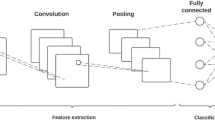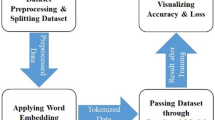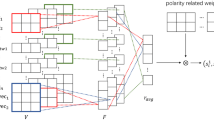Abstract
Traditional methods of annotating the sentiment of a document are based on sentiment lexicons, which have been proven quite efficient. However, such methods ignore the effect of supplementary features (e.g., negation and intensity words), while only consider the counts of positive and negative words, the sum of strengths, or the maximum sentiment score over the whole document primarily. In this paper, we propose to use convolutional neural network (CNN) and long short-term memory network (LSTM) to model the role of negation and intensity words, so as to address the limitations of lexicon-based methods. Results show that our model can not only successfully capture the effect of negation and intensity words, but also achieve significant improvements over state-of-the-art deep neural network baselines without supplementary features.
The research has been supported by the National Natural Science Foundation of China (61502545, U1611264, U1711262), Guangdong Science and Technology Program grant (2017A050506025), a grant from the Research Grants Council of the Hong Kong Special Administrative Region, China (UGC/FDS11/E03/16), and the Internal Research Grant (RG 92/2017-2018R) of The Education University of Hong Kong.
Access this chapter
Tax calculation will be finalised at checkout
Purchases are for personal use only
Similar content being viewed by others
References
Abadi, M., Barham, P., Chen, J.M., Chen, Z.F., Davis, A., Dean, J., Devin, M., Ghemawat, S., Irving, G., Isard, M., Kudlur, M., Levenberg, J., Monga, R., Moore, S., Murray, D.G., Steiner, B., Tucker, P., Vasudevan, V., Warden, P., Wicke, M., Yu, Y., Zheng, X.Q.: Tensorflow: a system for large-scale machine learning. In: OSDI, pp. 265–283 (2016)
Baccianella, S., Esuli, A., Sebastiani, F.: SentiWordNet 3.0: an enhanced lexical resource for sentiment analysis and opinion mining. In: LREC, pp. 2200–2204 (2010)
Choi, K., Joo, D., Kim, J.: Kapre: On-GPU audio preprocessing layers for a quick implementation of deep neural network models with Keras. CoRR, abs/1706.05781 (2017)
Chung, J.Y., Gulcehre, C., Cho, K.H., Bengio, Y.: Empirical evaluation of gated recurrent neural networks on sequence modeling. CoRR, abs/1412.3555 (2014)
Guerini, M., Gatti, L., Turchi, M.: Sentiment analysis: How to derive prior polarities from SentiWordNet. In: EMNLP, pp. 1259–1269 (2013)
Hochreiter, S., Schmidhuber, J.: Long short-term memory. Neural Comput. 9(8), 1735–1780 (1997)
Hu, M.Q., Liu, B.: Mining and summarizing customer reviews. In: KDD, pp. 168–177 (2004)
Kim, S.M., Hovy, E.: Determining the sentiment of opinions. In: COLING, Article no. 1367 (2004)
Kim, Y.: Convolutional neural networks for sentence classification. CoRR, abs/1408.5882 (2014)
Mikolov, T., Chen, K., Corrado, G., Dean, J.: Efficient estimation of word representations in vector space. CoRR, abs/1301.3781 (2013)
Pang, B., Lee, L.: Seeing stars: Exploiting class relationships for sentiment categorization with respect to rating sales. In: ACL, pp. 115–124 (2005)
Socher, R., Perelygin, A., Wu, J., Chuang, J., Manning, C.D., Ng, A., Potts, C.: Recursive deep models for semantic compositionality over a sentiment treebank. In: EMNLP, pp. 1631–1642 (2013)
Zeiler, M.D.: ADADELTA: an adaptive learning rate method. CoRR, abs/1212.5701 (2012)
Author information
Authors and Affiliations
Corresponding author
Editor information
Editors and Affiliations
Rights and permissions
Copyright information
© 2018 Springer International Publishing AG, part of Springer Nature
About this paper
Cite this paper
Xu, Z. et al. (2018). Sentiment Classification via Supplementary Information Modeling. In: Cai, Y., Ishikawa, Y., Xu, J. (eds) Web and Big Data. APWeb-WAIM 2018. Lecture Notes in Computer Science(), vol 10987. Springer, Cham. https://doi.org/10.1007/978-3-319-96890-2_5
Download citation
DOI: https://doi.org/10.1007/978-3-319-96890-2_5
Published:
Publisher Name: Springer, Cham
Print ISBN: 978-3-319-96889-6
Online ISBN: 978-3-319-96890-2
eBook Packages: Computer ScienceComputer Science (R0)




